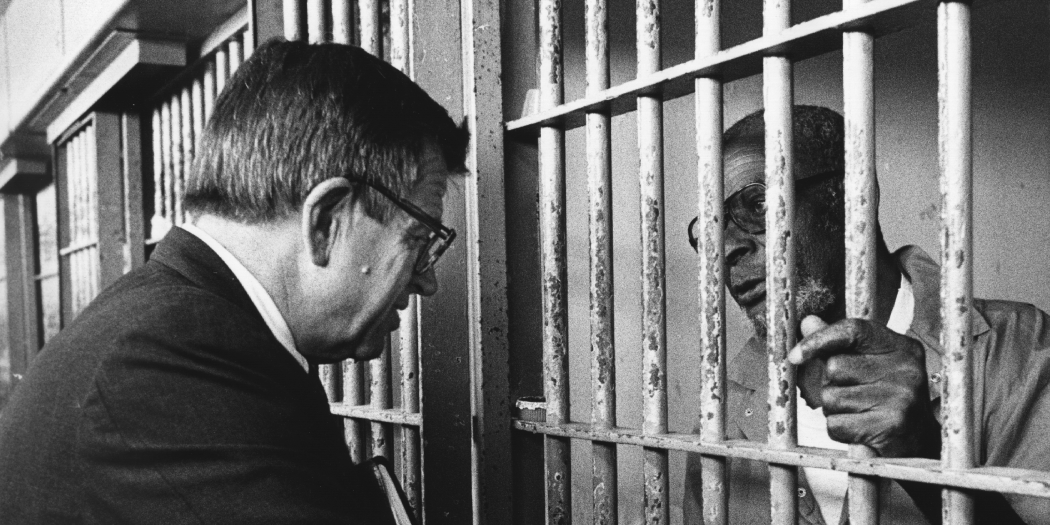Chuck Colson and the Watergate Scandal at 50

The following resource was originally posted on June 18, 2022. It was written by Prison Fellowship Board Advisor Bruce Ashford in remembrance of the 50th anniversary of Watergate.
On June 17, 1972, five perpetrators broke into the Democratic National headquarters in Washington, DC. Eventually, investigators discovered that then-President Nixon had approved plans to cover up his administration's involvement in the break-in. In the end, 69 people were indicted and 48 persons convicted for clandestine and illegal activities on behalf of the Nixon administration and the committee for his reelection.
Among those arrested was Charles "Chuck" Colson, who served as special counsel to the President. Colson was known as a ruthless political operative, having been described by journalist David Plotz as Nixon's "hard man, the 'evil genius' of an evil administration" and by White House Chief of Staff H. R. Haldeman as the president's "hit man."
In 1971, Colson had authored a memo listing Nixon’s major political opponents. News stories circulated, saying that Colson had boasted that he would "would walk over my own grandmother if necessary" to secure Nixon's reelection.
Thus, when Colson was indicted, convicted, and sentenced to prison, he experienced it as a personal disaster. Yet, during his seven-month stint at Maxwell Correctional Facility (Alabama), Colson experienced a profound spiritual renewal that would transform the remainder of his life and exert enormous influence on American society.
FROM HARDBALL POLITICS TO FEDERAL PRISON
In his memoir, Born Again, Colson wrote, "I found myself increasingly drawn to the idea that God had put me in prison for a purpose and that I should do something for those I had left behind." In other words, what Colson had initially experienced as an unmitigated personal disaster morphed into an experience of unprecedented divine blessing.
He emerged from prison with a new life mission of mobilizing God's people to minister to prisoners. Accordingly, in 1976, he founded Prison Fellowship, our nation's largest Christian nonprofit serving prisoners, former prisoners, and their families. He became the nation's leading advocate for criminal justice reform, a process that led to his reception of the Templeton Prize for Progress in Religion in 1993.
In addition to prison ministry, Colson founded the organization now known as the Colson Center, which equips Christians to live out the implications of their Christian faith in every sphere of culture—business, politics, law, education, marriage and family, art, science, and so forth.
Further, he co-founded (together with Father Richard John Neuhaus) Evangelicals and Catholics Together (ECT), a collaborative group of Catholic and evangelical religious scholars who articulate the common ground between Catholicism and Evangelicalism for the sake of witness to the world.
Finally, Colson became a prolific author and media personality after having been released from prison. Interested readers might wish to start with Born Again, Colson's memoir revealing how a man who had once made a "god" out of power and success, ironically found God through disgrace and incarceration.
Readers might also be interested in Chuck Colson Speaks, a collection of twelve speeches revealing Colson's perspective on a wide range of issues such as the moral law, leadership, and social justice; How Now Shall We Live?, a bestselling text that applies the Christian worldview to various sectors of society and spheres of culture; and My Final Word, a collection of Colson's articles on "hot button" issues such as criminal justice, Islam, same-sex marriage, secularism, and the persecution of Christians.
FROM UNMITIGATED DISASTER TO UNBOUNDED BLESSING
Chuck Colson passed away April 21, 2012. Yet, his legacy lives on through the work of Prison Fellowship, the Colson Center, his many books, and—perhaps most importantly—the people whose lives he touched through personal interaction.
His life is instructive in many ways. One lesson we can learn is that, if we find ourselves "walking through hell," we should keep on walking. When Colson was indicted, arrested, and imprisoned, he didn't wallow in self-pity or give up on life. Instead, he moved forward. He determined to make amends for his past misdeeds, reorganize his present according to God's will, and leave the future in God's hands.
Another lesson is that, often, we don't know a disaster from a blessing. In fact, God often turns a disaster into a blessing. When Colson was imprisoned—stripped of his dignity and his career—little did he know that God was in the midst of preparing Colson for future public ministry. While the presiding judge was in a courtroom delivering a guilty verdict and thus removing Colson's liberties, God was in heaven forgiving him of his sins and planning the future reconstruction of Colson's life.
And these two lessons coalesce to form the moral of the story. After his career in hardball politics ended in flames, Chuck Colson emerged as one of the most influential evangelical leaders of the twentieth century, influencing countless prisoners, public figures, and everyday citizens. When he found himself in hell, he kept on walking; and through his obedience, God turned an unmitigated disaster into an unbounded blessing.
DID YOU ENJOY THIS ARTICLE?
Make sure you don' t miss out on any of our helpful articles and incredible transformation stories! Sign up to receive our weekly newsletter, and you' ll get great content delivered directly to your inbox.
Your privacy is safe with us. We will never sell, trade, or share your personal information.